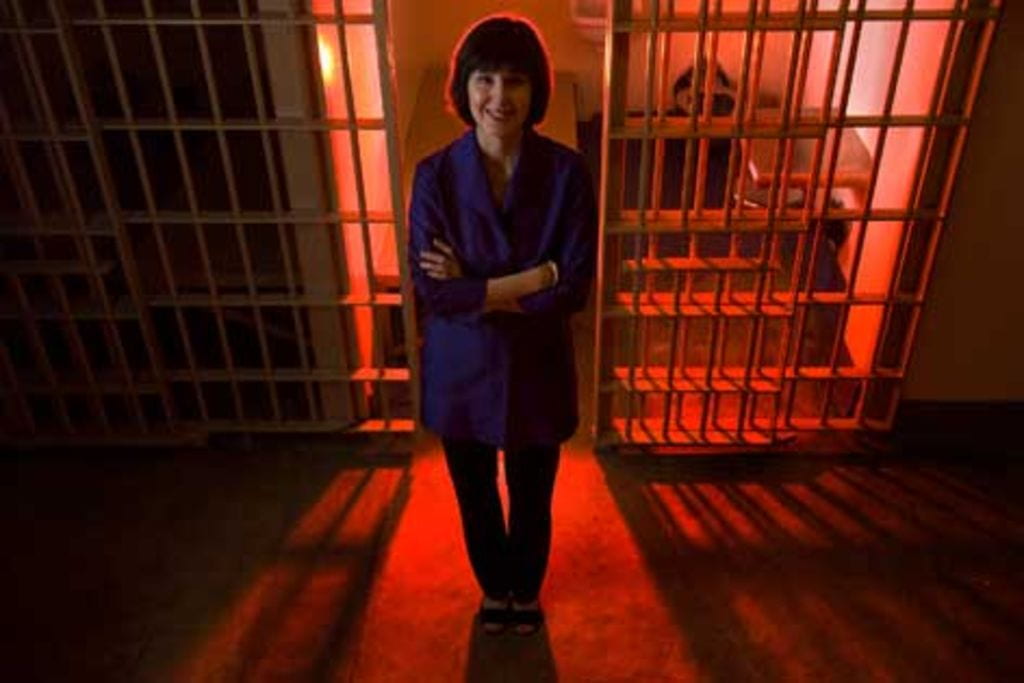What happens after parole?
UCI professor Susan Turner studies crime and punishment to help state policymakers develop prison and parole programs based on effectiveness — not emotion or politics.

Susan Turner’s office at UC Irvine looks as cheerful as a
kindergarten classroom, with a bright mural of butterflies painted by
her mother and a vase filled with flowers crafted from beads. Her
surroundings belie the often grim task at hand: researching crime and
punishment.
As director of UCI’s Center for Evidence-Based Corrections
and a criminology, law & society professor, Turner studies methods
to deter violent felons, sex offenders and other “bad folks” from
committing more crimes. She evaluates rehabilitation, reentry and
probation programs to provide law enforcement and justice agencies with
data unbiased by emotion or politics. Still, her impartial findings
invariably raise somebody’s ire.
“We try to get good information
out to policymakers, but it’s tough,” Turner says. “No matter what you
release, someone will criticize your work: crime victims, district
attorneys, politicians who want to look tough on crime, corrections
officials managing overcrowded prisons. Different groups have different
agendas.”
Anti-crime initiatives are often proposed in the wake
of high-profile cases, like the 2009-10 rape and murder of two San
Diego-area girls by convicted sex offender John Albert Gardner III.
That tragedy has led to the push for “Chelsea’s Law,”
a state measure requiring all sex offenders to wear global positioning
system devices that track their movements and alert police if they
enter restricted areas near schools or parks.
In a study,
however, Turner found little evidence that the gadgets reduce criminal
behavior. She compared the rap sheets of about 100 offenders who wore
GPS ankle bracelets with those of about 100 who did not. She found that
43 percent of the first group re-offended versus 48 percent of the
second, although those wearing tracking devices were less likely to
abscond or fail to register as a sex offender.
“GPS devices are
not a panacea,” she says. “They only show a sex offender’s location;
they don’t prevent criminal activity. Whatever makes offenders do those
things, they still can do them.”
Turner and her staff investigate prison and parole programs for the California Department of Corrections & Rehabilitation. They recently created the California Static Risk Assessment tool to help the department supervise parolees based on their likelihood of committing other crimes.
“We
studied the rap sheets of 103,000 parolees over a three-year period to
see which ones were arrested and convicted after their release. Then we
used the data to develop an instrument that could classify individuals
according to risk of re-offending,” Turner says.
Now the Center for Evidence-Based Corrections is examining the effect of non-revocable parole.
A controversial state law that took effect in January eliminates parole
for low-risk offenders so that limited resources can be devoted to more
serious, violent offenders.
“We’re looking at whether those who
receive intensive parole supervision behave differently in terms of
arrests and recidivism,” Turner says.
California has the nation’s
highest recidivism rate – 70 percent – and reducing it is a complex
challenge, she says: “Habitual criminals have a lot of serious
deficits. They might be illiterate, be drug addicts and have no job
skills, and they often don’t get services in prison – like counseling
or education – to remedy that. It’s hard for them to re-enter society.
Everyone wants a quick fix, but there isn’t one.”
Turner has
devoted her career to studying criminal justice, working for more than
20 years as a senior behavioral scientist for the nonprofit RAND Corp. in Santa Monica before joining UCI in 2005.
“Susan
Turner brings rigorous social science research to bear on evaluating a
broad range of innovative programs within the criminal and juvenile
justice systems,” says Valerie Jenness, interim dean of social ecology
and a fellow criminology, law & society professor. “Our communities
are better off as a result of her analysis and engagement with criminal
justice agencies.”
Turner, who unwinds by playing the flute in the UCI Symphony Orchestra,
hopes to expand the scope of the Center for Evidence-Based Corrections’
studies beyond California to affect policies nationwide.
“Making
decisions based on your gut or the crime of the week is not
responsible,” she says. “If we can help policymakers be smart about
what works to reduce crime and what doesn’t, we can move the system
forward. That’s the reward.”